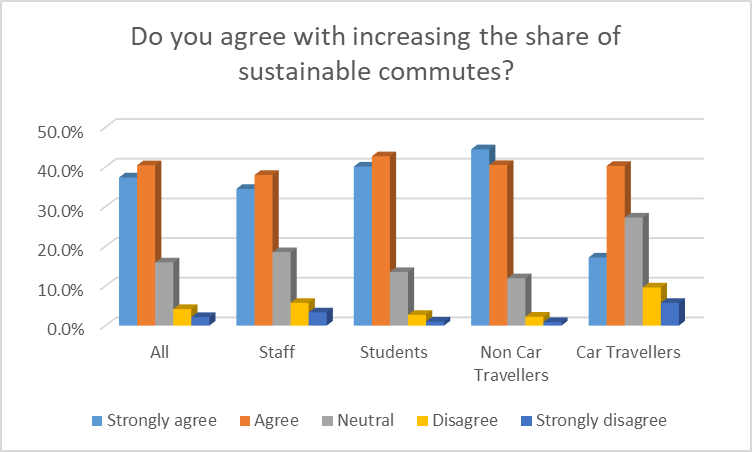Our most polluting journeys are our longest ones, even though they are fewer in number. Three-quarters of carbon emissions are from places with further than one hour’s public transport commute to UoB. That is not to say that local travel is unimportant, far from it. First, all journeys finish at our door, affecting the local road system and air quality. Second, nearly 35,000 members of our community live within one hour’s bus or train ride of campus and commuting is a major part of the university life for all.
Encouraging all car drivers within 30 minutes’ cycle of campus to commute by bike would save nearly 400 tonnes of carbon emissions per year; enabling those in the 60 minute public transport zone to take the train and bus would save over 300 tonnes; and helping those beyond 60 minutes to car share and take the train would save over 3100 tonnes, all for a total of over 3800 tonnes yearly—37% of UoB commuting emissions.
Train or car journeys are the main choices for the third of our staff and over 13% of our students who live further than 60 minutes on public transport from their front door to Old Joe. Enabling and encouraging lift sharing and making rail journeys more attractive will make the difference for these sizeable populations and give them the opportunity to reduce the carbon impact of their commute.
This analysis showed nearly 50% of staff live within a 30 minutes’ cycle to campus and two-thirds could travel 60 minutes on public transport from their front door to Old Joe. Yet solo car driving is still the most popular mode of transport amongst these groups, which means that there is still progress to be made, and that there are opportunities to make it, by following the priorities identified here.
The following table estimates the marginal carbon reduction of 100 commuters moving down the ladder of carbon-intensive commutes from the most to the least: solo car journeys, to shared car journeys, to bus travel, to train travel to cycling to walking, as appropriate for the distance.
| |
Less than 30 mins’ cycle: 100 fewer solo car drivers and 25 more cyclists, bus travellers, train travellers and pedestrians each
|
More than 30 mins’ cycle and less than 60 mins’ public transport: 100 fewer solo car drivers and 50 more bus travellers and train travellers each
|
More than 60 mins’ public transport: 100 fewer solo car drivers and 50 more train travellers and car sharers each
|
|
Overall emissions reduction (tonnes)
|
-14.9
|
-24.0
|
-156.3
|
|
Current no. of solo car drivers
|
1769
|
1056
|
2360
|
UoB will not decarbonise its commute alone—to take one mode as an example, bus companies need to upgrade to zero-emission buses, and national planners need to assure the transition to renewable energy for that to happen. The Department for Transport is striving towards more the objectives of active travel locally, stronger public transport networks and electrification[1]*. As an employer and education establishment, UoB can make its facilities for active travel first-rate, set a variety of relevant policies, lay on sustainable travel programmes and assistance and positively influence and support the development of the local transport network towards the future just outlined.
The survey results and free responses highlighted time and again that access to a private vehicle is the glue currently binding many busy, pressured lifestyles, and it is important not to demonise individual choices. Rather, the broad support amongst our community for increasing the share of sustainable commutes to UoB is to be celebrated. The reasons for doing so start with the climate emergency of global heating and encompass highway congestion, civic equity, air quality and public health and wellbeing. University of Birmingham is in the rare position of having good knowledge of its commuting and being able to make an informed and positive impact on these major challenges of our time.

*[1] Decarbonising Transport – A Better, Greener Britain (publishing.service.gov.uk)